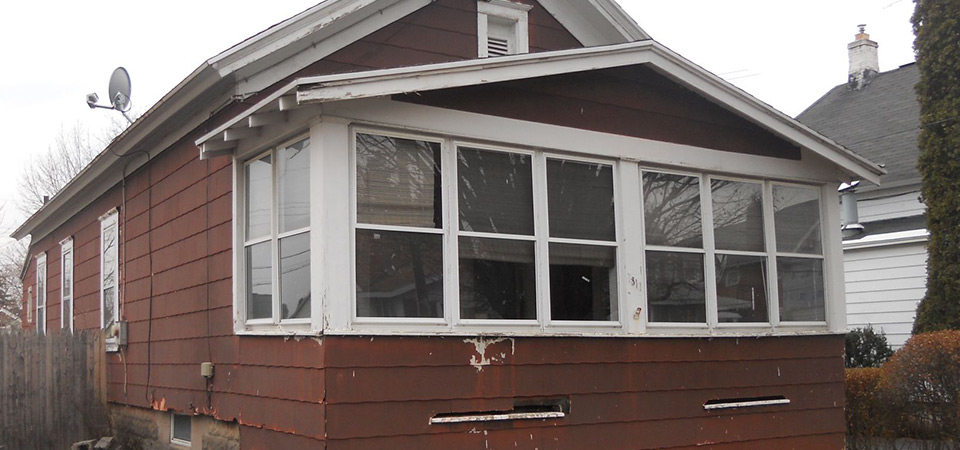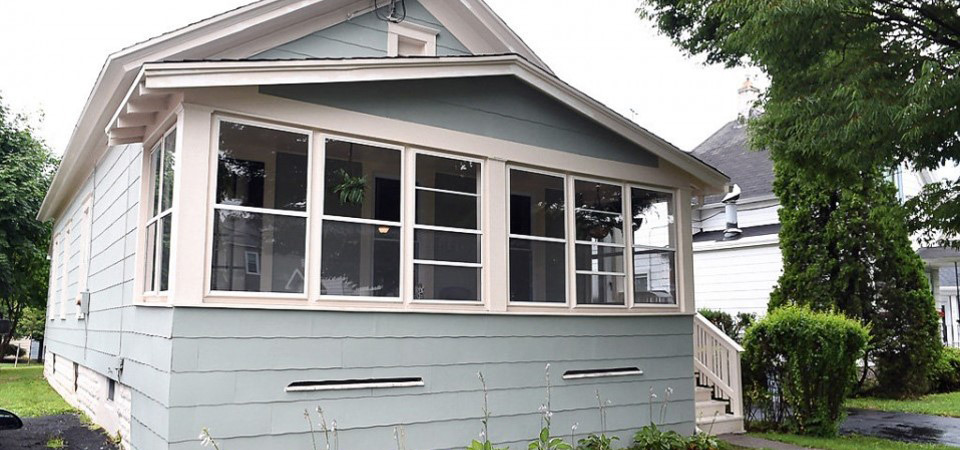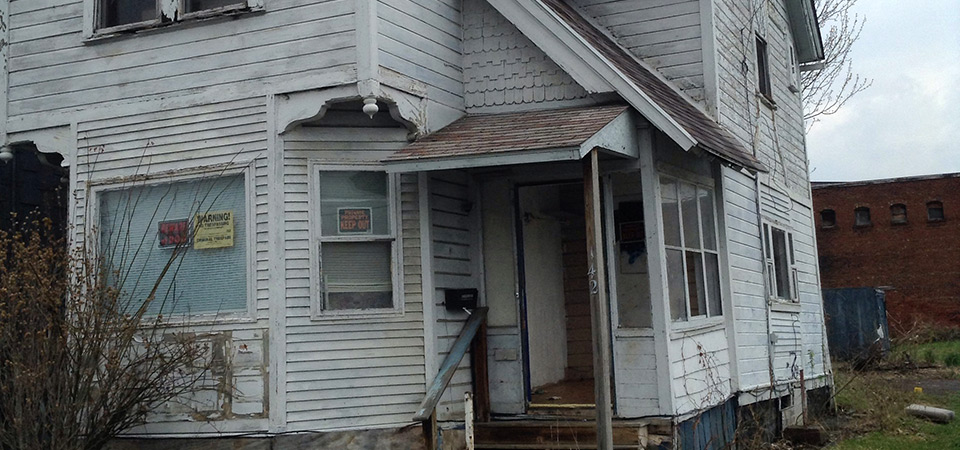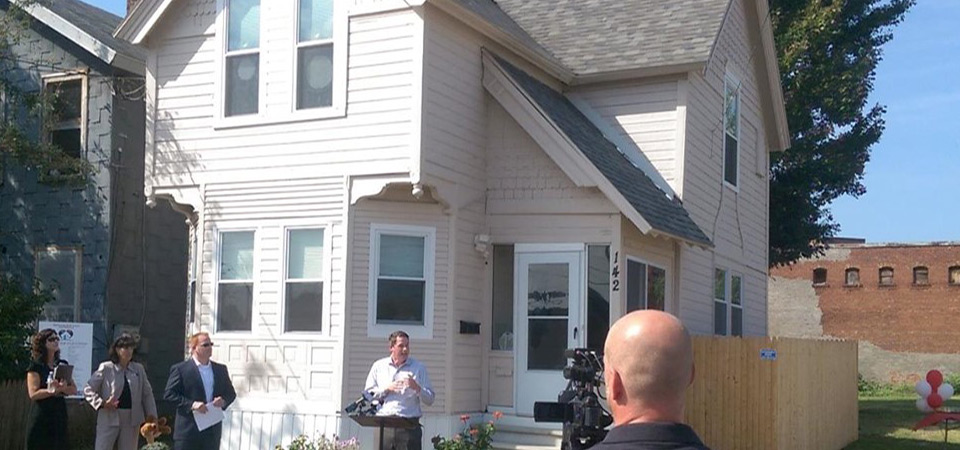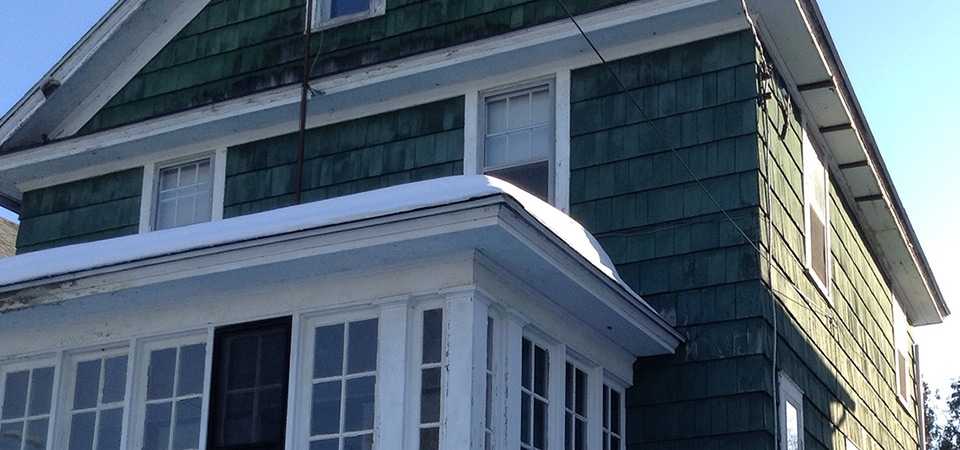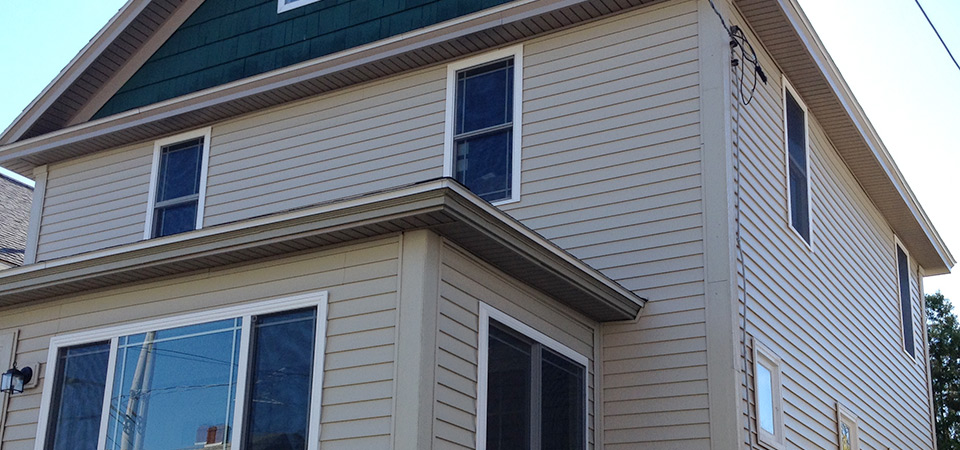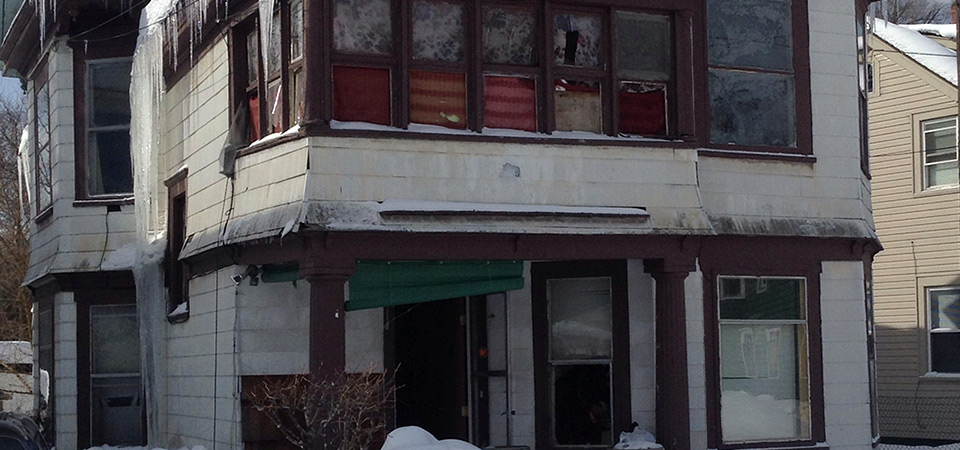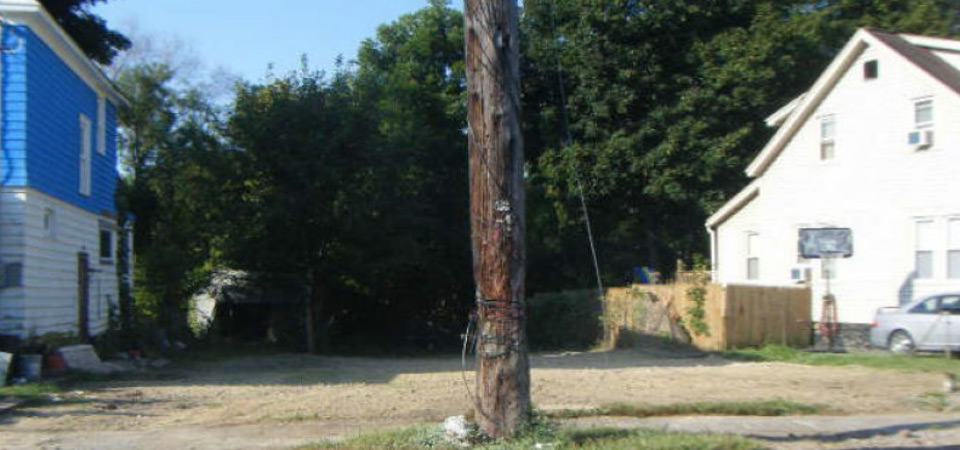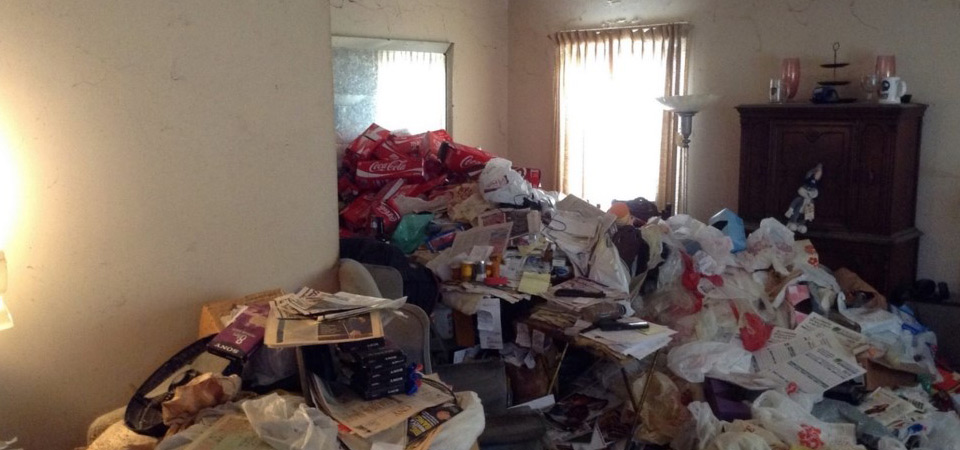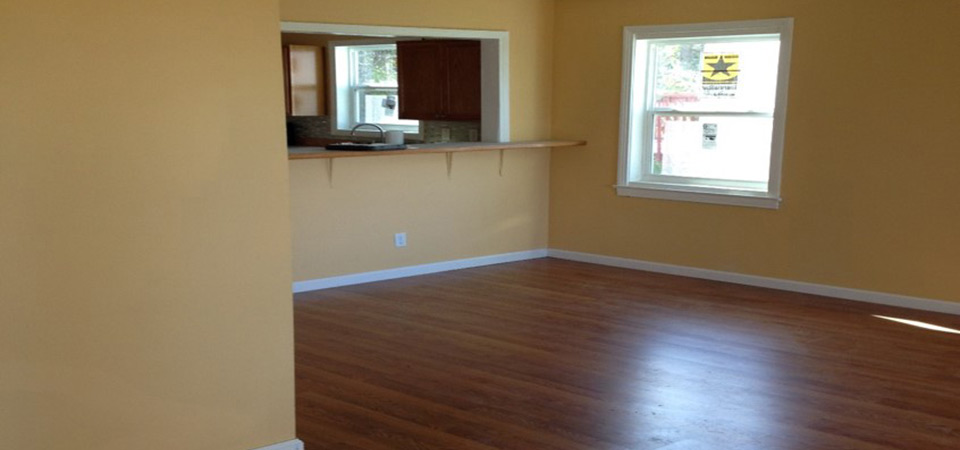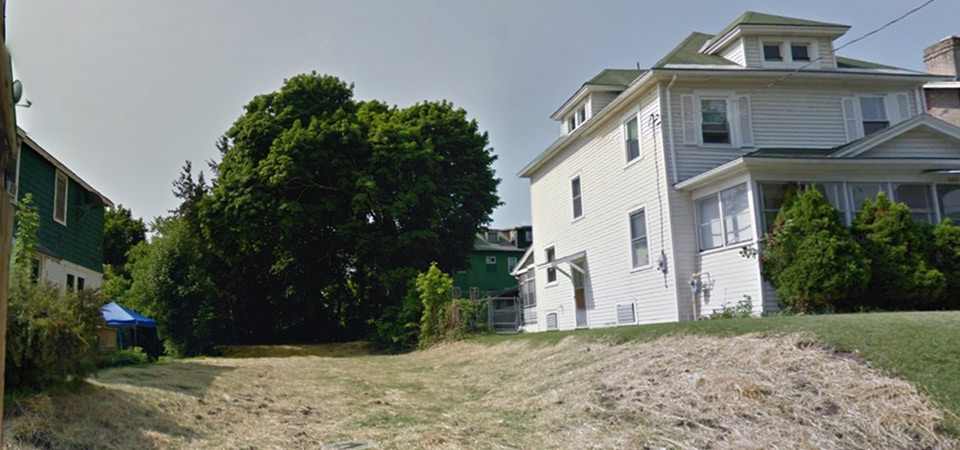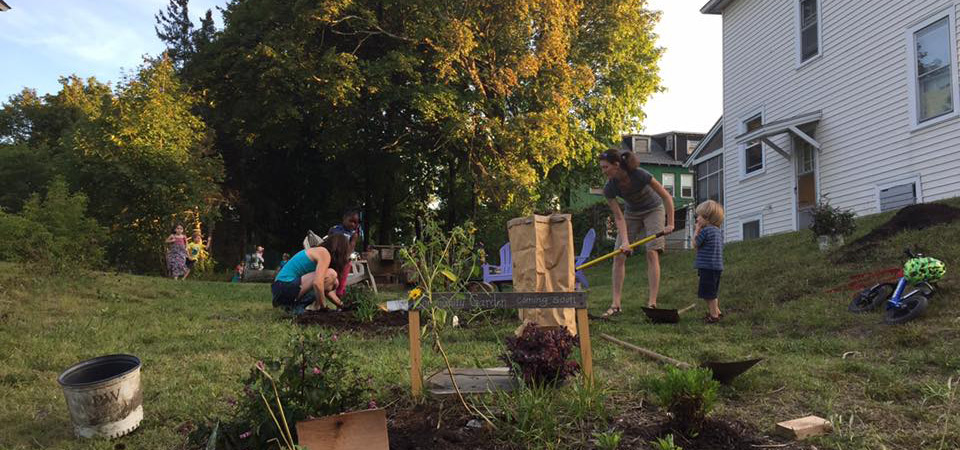Before / After Photos
INTAKE/EVALUATION
Upon acquiring a property, the Land Bank’s maintenance contractor evaluates the property, addresses any safety hazards, and documents its condition. Vacant properties are boarded if necessary and clean-up is ordered. Occupants are offered a lease or relocation assistance depending on the condition of the property.
Properties for Sale
Available Properties are listed on the Land Bank’s website. Most of our listings have a scope of work attached, letting you know what work is needed to bring the property up to code. That’s a minimum scope of work and you’re welcome to do more work or higher end finishes if you want, but budget accordingly. We include an estimated cost to complete the work and, if you decide you want to submit an offer, you’ll need to attach proof of funds showing that you have the financing to complete the purchase and renovations (proof of funds can be a bank statement showing cash on hand or a pre-approval for a construction loan). You’ll be required to complete those renovations and bring the property up to code within an agreed upon length of time – typically 12 months after you take title.
We list our properties “for sale by owner” with our in-house sales staff. You can call our office to schedule a showing with our sales specialist, who can also help you fill out a purchase offer and answer any questions you have about the purchase process. Some of our properties have lock boxes and can be shown by outside realtors; your realtor should call our office for more info on that. We don’t sell properties sight-unseen so the first step is to schedule a showing.
The Land Bank may place additional requirements on certain properties or restrict what buyers may do with them, such as those homes included in the Home-Ownership Choice program. Visit the Properties page for more information.
Land Bank Programs
Brownfields
The Greater Syracuse Land Bank is applying for a FY26 EPA Brownfield Cleanup Grant for 500 Hawley Ave., commonly known as Patrick’s Dry Cleaners. You can learn more about our application by watching our public presentation on youtube. The slides we presented can be found here.
Learn more about the Land Bank’s plans to apply for EPA Brownfield Cleanup Grant . If you want to receive the draft application, email us at info@syracuselandbank.org. If you want to submit comments or questions about the application, you must submit your comments or questions to info@syracuselandbank.org by 5 PM, January 21.
Section updated 1/7/26:
Many of our communities in Onondaga County have properties that are abandoned or underutilized in part due to known or suspected environmental contamination associated with past uses. These properties are commonly referred to as “brownfields.”
Brownfield – noun. 1. real property, the expansion, redevelopment, or reuse of which may be complicated by the presence or potential presence of a hazardous substance, pollutant, or contaminant. 2. abandoned or underutilized property that is not being redeveloped because of fears that it may be contaminated with hazardous substances.
The Land Bank was formed by the City and County to return abandoned properties, including brownfields, to productive use. To do so, we work to remove impediments preventing private buyers from purchasing and redeveloping property. With brownfields, the unknowns are often an impediment. EPA Assessment Grant funds have enabled us to test brownfields and eliminate those “unknowns” about potential contamination. This may show potential buyers that the cost of cleanup is feasible and/or may provide the information they need to apply for grants or tax credits for cleanup. If simply eliminating these unknowns isn’t enough
USEPA Brownfield Assessment Grant Projects
In 2019, the Land Bank was awarded two United States Environmental Protection Agency (USEPA) Community-Wide Assessment Grants totaling $600,000 to be used to perform complete environmental assessment and reuse planning activities on eligible brownfields sites throughout Syracuse and Onondaga County. The Land Bank was the lead member of a Coalition that included the Syracuse Industrial Development Agency (SIDA) and the Onondaga County Industrial Development Agency (OCIDA). This funding was spent over a 3-year project period extending from October 1, 2019 through September 30, 2022. With these grant funds, the Land Bank completed 19 Phase I and 9 Phase II environmental site assessments and 1 hazardous building materials survey.
In 2022, the Land Bank was awarded another USEPA Community-Wide Brownfield Assessment Grant totaling $1 million. This time the Land Bank applied as the lead member of a coalition including Blueprint 15 and the Northeast Hawley Development Association (NEHDA). The Land Bank and their consultants will work with these nonprofit partners to prioritize sites for environmental testing. These sites may include properties that are owned by or in the process of being acquired by the Land Bank, properties owned by other governmental entities or public authorities, and privately owned properties if they meet certain eligibility criteria and are prioritized for testing by the coalition partners. These funds must be spent by 9/30/27.
USEPA brownfield assessment grant funding can be used to complete environmental assessments and cleanup/reuse planning for individual brownfield sites, as well as to complete inventories of brownfields and to conduct various forms of outreach relevant to individual sites or the grant project as a whole.
USEPA Brownfield Cleanup Grant Projects
In 2025, the Land Bank was awarded an EPA Brownfield Cleanup Grant of nearly $4 million to clean up 917 Montgomery and 541 Seymour St. (commonly known as the Consolidated Industries Building). 917 Montgomery will be remediated while keeping the existing building in place for a future business to occupy. 541 Seymour St will include the demolition of the existing building, which will make way for 12-13 residential lots for new construction. We anticipate that we will sign our contract with the EPA for this grant soon and that cleanup will be underway at both sites in early 2026.
Contact Information
For additional information or to nominate a site for grant funding consideration, please contact:
Katelyn Wright, Executive Director, kwright@syracuselandbank.org
Disclaimer: Although this project has been funded by the EPA, the contents of this material does not necessarily reflect the views and policies of the EPA.
Side Lot Sales
In many instances the sale of a vacant lot to the owner of the property next door is consistent with the Land Bank’s disposition policies (although in some instances the land will be held for site assembly or new construction). When Side Lot sale is the best option, the Land Bank will offer the property for sale for a nominal fee.
The Land Bank typically requires that the applicant combine the lot with their existing property through a re-subdivision (requires approval by the Planning Commission and a stamped property survey) prior to conveying title.
Community Garden Leases
The Land Bank leases vacant lots to community groups and nonprofits for $1/year for community gardens. The tenants are responsible for mowing, littler pickup, and property maintenance. Contact our office for more information.
Home-Ownership Choice Program
In order to promote home-ownership, the Land Bank will only accept offers on Home-Ownership Choice properties from buyers who plan to occupy the home as their primary residence or who will sell to an owner-occupant.* The Land Bank’s lien against the property isn’t discharged until the property is renovated and owner-occupied. The listing notes for the property indicate whether it’s in this program.
The Land Bank requires all first time homebuyers to take a HUD-approved homebuyer education course. Most homes the Land Bank sells require some renovation. Many banks offer loans to credit-worthy applicants that cover purchase and renovation costs, including 203K loans and similar loan products. Home HeadQuarters offers these, as well, and in many instances some renovation costs may take the form of a grant for income-qualified buyers. Learn more about Home HeadQuarters’ financing available for Home-Ownership Choice houses.
* We will make an exception for an owner-occupant who lives on that block who may want to buy, renovate, and keep a property as a rental so they can control property on their block.
Tenant to Home-Owner Program
Some properties are occupied at the time the Land Bank acquires them. Initially the Land Bank will offer a month-to-month lease to these occupants if the property is in acceptable condition. In most instances when the Land Bank plans to market these properties for sale, the occupant at the time of foreclosure will be offered the first opportunity to purchase the property. (Note: The Land Bank’s disposition policy prohibits the sale of properties back to the owner who was foreclosed upon for tax-delinquency or the immediate family member of the prior owner.) The Land Bank requires all first time homebuyers to take home owner education courses and to receive other financial counseling.
Stabilization and Renovation
When the Land Bank acquires properties, it will make preventive repairs in order to stabilize the structure and prevent deterioration. In some instances the Land Bank will renovate properties prior to sale in order to ensure that it has a mix of move-in ready homes available for purchase in addition to properties needing renovation. This enables the Land Bank to promote home-ownership to stabilize neighborhoods and to make sales at higher prices in order to help increase surrounding property values.
Demolition/Deconstruction
The Land Bank undertakes preventive maintenance to prevent properties from deteriorating and becoming demolition candidates, but some properties are beyond renovation at the time of acquisition. In all instances the Land Bank pursues architectural salvage prior to demolition. The Land Bank is currently engaged in a pilot program to test “deconstruction” as an alternative to demolition so that building materials are recycled rather than landfilled.
Land Assembly and Land Banking
In many instances, the Land Bank may attempt to assemble larger parcels of land before marketing them for sale, in order to accomplish more preferable redevelopment outcomes – for example, combining two vacant lots for new construction rather than selling just one to an adjacent property owner. The Land Bank may also assemble land for development partners in neighborhood revitalization or affordable housing, for conservation purposes, or for community-based uses such as gardens or parks. In some instances the Land Bank may engage in land banking and hold land for an extended period of time in order to develop a coordinated plan for the area’s revitalization, raise funds for special projects, and/or acquire additional nearby properties.

